10 Tips for a Healthy Immune System (part four)
Welcome to part 4 in our series on how to get, maintain, and maximize your immune health. Part 4 is probably the section that most folks have been looking for, actual supplements that can support and benefit your immune system. In previous posts we looked at the importance and impact of what we eat, the rest we get, stress, and sugar, all variables that have profound effects on your immune system but are too often overlooked with many folks just reaching for a supplement of some sort to help. Well this is the section for that, but, I strongly encourage you take a look at the previous posts because they are so impactful and immune-altering.
“Supplement” is defined by the Cambridge Dictionary as “something added to complete a thing, supply a deficiency, or reinforce or extend a whole.” This needs to be emphasized, supplements are meant to do just that, “supplement”, ‘add to a complete thing’ – healthy dietary choices, “supply a deficiency” – we often come up short in a number of immune essential nutrients, zinc for instance, or “extend a whole” – like a healthy lifespan. What supplements are not; supplements are not replacements for making good healthy choices, nor are supplements cover for making poor health choices, they do not make up for living on junk food or not getting enough sleep. Immune health, just like overall health and vitality is most effectively supported by taking a holistic approach that covers all the bases.
 The approach I am taking in this post breaks down a number of immune essentials and allies, first, essential nutrients, then holistic health and immune supporting tonics. Essential immune nutrients are ones that our immune systems simply can’t do their job well without adequate levels. Holistic immune support can be found by incorporating what are called functional mushrooms, remedies that can enhance one’s immune function while supporting interdependent systems as well as overall vitality.
The approach I am taking in this post breaks down a number of immune essentials and allies, first, essential nutrients, then holistic health and immune supporting tonics. Essential immune nutrients are ones that our immune systems simply can’t do their job well without adequate levels. Holistic immune support can be found by incorporating what are called functional mushrooms, remedies that can enhance one’s immune function while supporting interdependent systems as well as overall vitality.
Essentials
While a healthy fully functioning resilient immune system is best supported by getting optimal levels of all nutrients there are a few that are, to some degree, immune specific, ones that even slightly inadequate levels may lead to faulty immune efforts and even disease. As I made the case in part 1, diet is key and supplementing the diet with a good multi-vitamin mineral is a good starting point to help ensure optimal intake levels of all the essential nutrients. There are a few though, that need to be emphasized:
Vitamin C – usually the first vitamin thought of when we think immune health. While it may not prevent colds and the flu (although it has been shown to reduce occurrence in highly stressed individuals), it has been shown to shorten the duration and severity of them. Vitamin C supports immune cell functions while strengthening immune cells and enhancing their infection fighting ability. It also can assist in cleaning out the old cells while helping replace new, fresh cells. Since it cannot be stored it is best to take frequently rather than in massive doses only once.*
Vitamin D – while vitamin C is most commonly associated as the cold and flu fighter, a number of studies suggest Vitamin D may play an even bigger role. One of the likely reasons we get more of these types of infections during the winter is because we are indoors more and not making this “sunshine vitamin”. It is also a nutrient we are often low in. 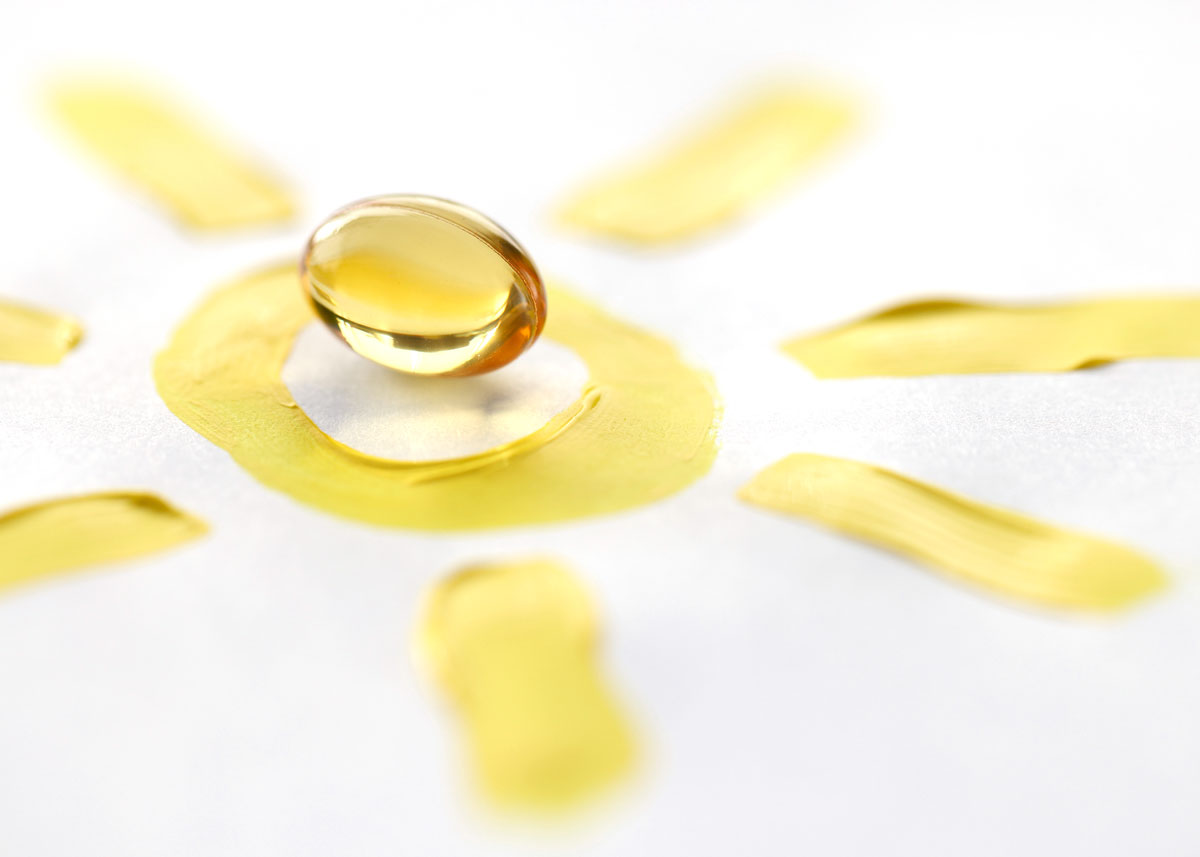 This fat soluble vitamin is essential for the functioning of the immune system. It enhances the actions of macrophage and monocytes, supports a healthy inflammatory response, improves innate immune efficiency, and modulates aspects of the immune system. Low levels of D are associated with a higher risk of upper respiratory tract infections.*
This fat soluble vitamin is essential for the functioning of the immune system. It enhances the actions of macrophage and monocytes, supports a healthy inflammatory response, improves innate immune efficiency, and modulates aspects of the immune system. Low levels of D are associated with a higher risk of upper respiratory tract infections.*
Vitamin A – it improves the ability of “good” gut bacteria to respond properly, important as we learn more and more about how gut health is essential to immune health and more. Vitamin A supports mucosal membrane health, an important barrier against infections, enhances macrophage function, stimulates cytotoxic T cells and enhances resistance to infections, especially in the respiratory tract.*
Zinc – this essential trace mineral is required for immune function and effectiveness of both the innate and adaptive immune systems. It is necessary for immune cell communication and development as well as a healthy inflammatory response. Zinc also supports the protective barriers that keep pathogens out. One study found that it may decrease the duration and hospitalization by 2 days with acute lower respiratory infections in children. Zinc deficiency is fairly common, with one estimate suggesting that close to 1/3 of older adults are deficient. Zinc should be taken at early onset for best results. This was confirmed by a study that say a reduction in the duration of colds by about 42% when taken on the 1st day of symptoms.*
Selenium – Another trace mineral, selenium is also essential to virtually all aspects of the immune system. It may also be involved in the regulation of excessive immune responses helping to slow inflammation. Sufficient levels of selenium are associated with an enhanced immune response while deficiencies are associated with less immune protection. Selenium is easy to get from your diet, just 2 to 3 Brazil nuts a day will provide the body what it needs.*
Holistic Immunity
I always find the discussion around tonic remedies interesting, and at times confusing. For me, if I had a choice between two remedies, one that just alleviates a single specific concern, or, one that also assists in dealing with the same concern, but then also supports a number of other systems in my body, all the while increasing my overall health and vitality, well… this seems like a no-brainer to me. This is precisely what tonics do, they are all about maximizing your overall vitality all the while also imparting a numerous array of health supporting actions. These are remedies that are less about “boosting” the immune response, and more about building resilience, strength, and balance, exactly what we want in an immune system. This is doubly true when thinking long term health; save the “boosting” for specific short term situations when a quick boost is needed. Another key point supporting the use of tonics for immune health is the physiology. Over the last couple of decades it was become clear in the research that our immune system is closely tied to many other parts of our body, including the circulatory, digestive, respiratory systems as well as the mouth, skin, liver, brain and more. Fundamentally, immune health is whole body health.
And one category of tonic allies, with a long history of use in traditional medicine and now backed by a growing body of research, answers this call – namely, functional mushrooms. Many of these fungal friends have been used and highly prized for their health gifts for centuries. There are around 300 different mushrooms that have demonstrated immune supporting activities. They enhance immune health and function by operating through multiple mechanisms and pathways. They are also some of natures most promising health tonics.*
Reishi –  first up, and my personal favorite tonic, Ganoderma lucidum, known in Chinese medicine (TCM) as Ling zhi, the “herb of spiritual potency”. While rare in the wild, it is effectively cultivated when grown on logs. Reishi is an adaptogenic tonic that supports the heart, lungs, liver, kidney, brain, nerves, and of course the immune system. Traditionally said to boost vital energy (Qi), it nourishes what is called Shen in TCM, said to be the emotional/spiritual center of the body. Numerous studies have shown that it supports healthy cell growth and turnover. A human clinical study found it significantly enhanced cellular immunity in 80% of patients while supporting several immune factors, including interleukin-2, Interleukin-6, and interferon-gamma levels while increasing natural killer cell activity. Reishi supports a number of different types of immune cells and messengers, but its greatest gift may be one of encouraging a balanced immune response. One measure of this is it’s clinically confirmed ability to balance CD4/CD8 ratio, a key marker for a balanced immune system. Reishi has also been found to support sleep, something we saw the importance of in Part 2.*
first up, and my personal favorite tonic, Ganoderma lucidum, known in Chinese medicine (TCM) as Ling zhi, the “herb of spiritual potency”. While rare in the wild, it is effectively cultivated when grown on logs. Reishi is an adaptogenic tonic that supports the heart, lungs, liver, kidney, brain, nerves, and of course the immune system. Traditionally said to boost vital energy (Qi), it nourishes what is called Shen in TCM, said to be the emotional/spiritual center of the body. Numerous studies have shown that it supports healthy cell growth and turnover. A human clinical study found it significantly enhanced cellular immunity in 80% of patients while supporting several immune factors, including interleukin-2, Interleukin-6, and interferon-gamma levels while increasing natural killer cell activity. Reishi supports a number of different types of immune cells and messengers, but its greatest gift may be one of encouraging a balanced immune response. One measure of this is it’s clinically confirmed ability to balance CD4/CD8 ratio, a key marker for a balanced immune system. Reishi has also been found to support sleep, something we saw the importance of in Part 2.*
Cordyceps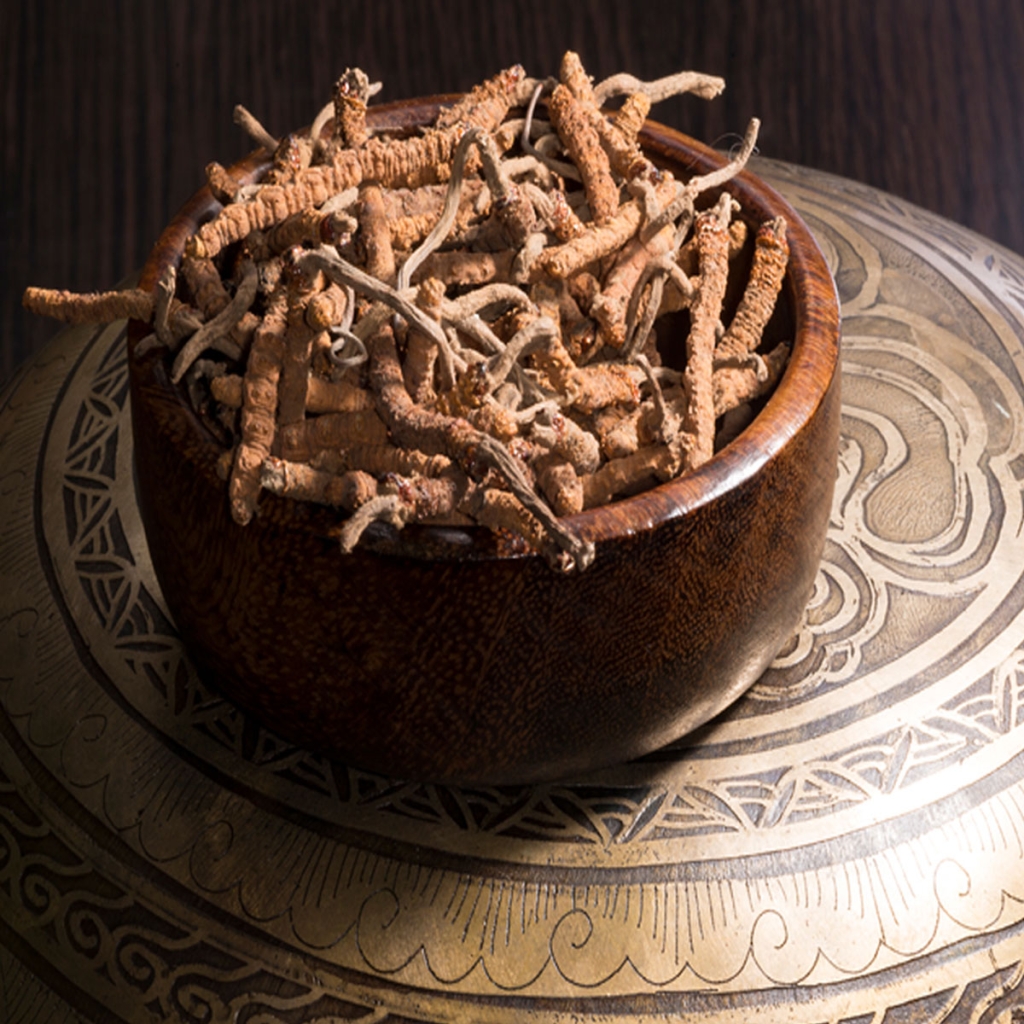 – a wonderful tonic partner to Reishi, Cordyceps also has been highly valued for centuries. Called Dong Chong Xia Cao which translates as “winter worm, summer grass” because it is a fungus that grows out of the head of a caterpillar at very high altitude in the Himalayan Mountains. (Don’t’ worry, our Cordyceps is worm-free and grown though a fermentation process). Cordyceps is a wonderful tonic for supporting lung, kidney, and heart health. One of its respiratory actions is to improve the uptake of oxygen, which is why climbers often will use it. Probably best known to boost energy and endurance, Cordyceps is excellent for strengthening the body as a whole and helping with recovery and rebuilding. Studies have found it to be effective at boosting the body’s endogenous antioxidant levels, including the body’s strongest anti-oxidant, glutathione. It can enhance immune function with its constituents affecting cytokine production, such as interleukin (IL)-1β, IL-2, IL-6, IL-8, IL-10, IL-12, and tumor necrosis factor-α, phagocytosis stimulation of immune cells, nitric oxide production, and stimulation of inflammatory response.*
– a wonderful tonic partner to Reishi, Cordyceps also has been highly valued for centuries. Called Dong Chong Xia Cao which translates as “winter worm, summer grass” because it is a fungus that grows out of the head of a caterpillar at very high altitude in the Himalayan Mountains. (Don’t’ worry, our Cordyceps is worm-free and grown though a fermentation process). Cordyceps is a wonderful tonic for supporting lung, kidney, and heart health. One of its respiratory actions is to improve the uptake of oxygen, which is why climbers often will use it. Probably best known to boost energy and endurance, Cordyceps is excellent for strengthening the body as a whole and helping with recovery and rebuilding. Studies have found it to be effective at boosting the body’s endogenous antioxidant levels, including the body’s strongest anti-oxidant, glutathione. It can enhance immune function with its constituents affecting cytokine production, such as interleukin (IL)-1β, IL-2, IL-6, IL-8, IL-10, IL-12, and tumor necrosis factor-α, phagocytosis stimulation of immune cells, nitric oxide production, and stimulation of inflammatory response.*
Note: The combination of Cordyceps in the morning and Reishi in the evening is my favorite one-two tonic punch for overall health and immune support.
Maitake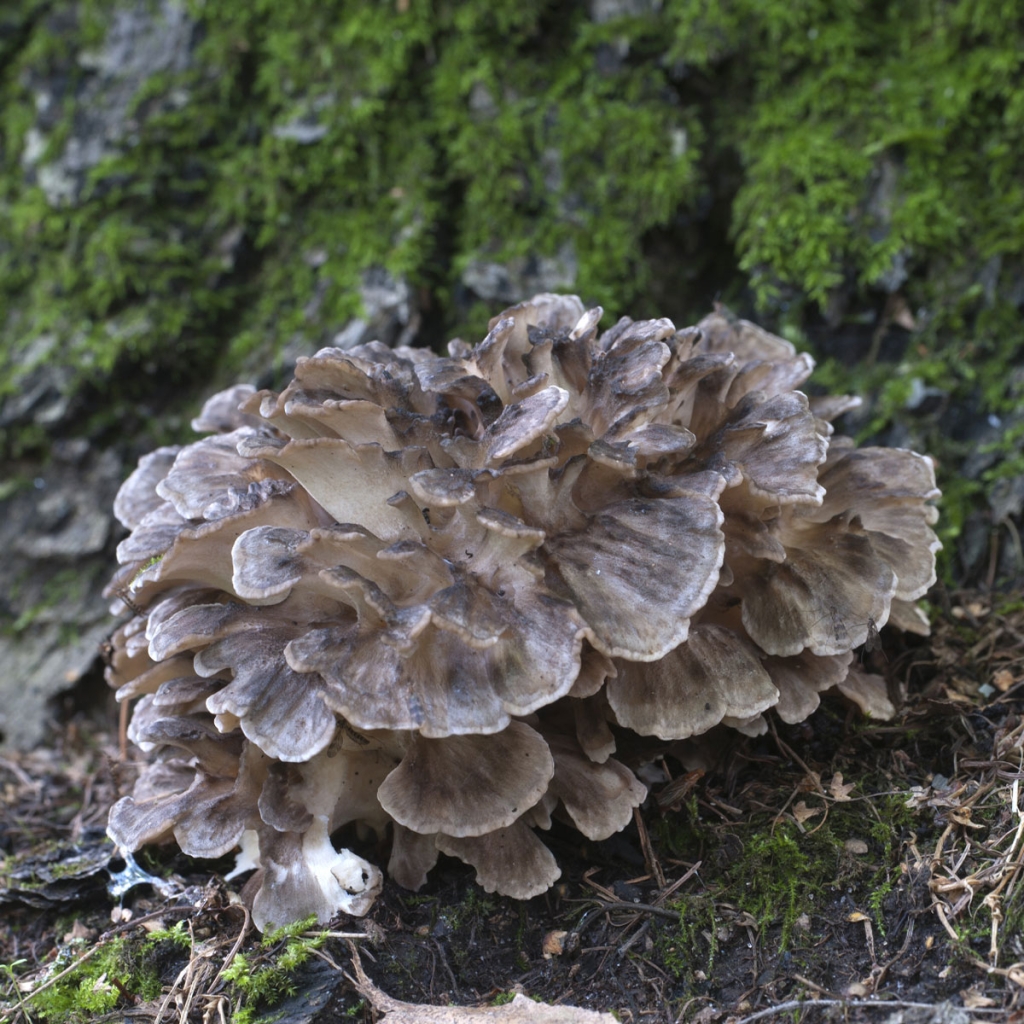 – this delicious mushroom is called “hen of the woods” in the US and grows at the base of hardwood trees. Maitake is best known for its immune activities. A comparison study with a number of commonly used mushrooms found that it was #1 for supporting immune activity and helping to support healthy cell growth and turnover. Studies have shown that it activates and increases production of natural killer cells and macrophage, induces the secretion of interferons (key immune defense proteins). Research also indicates that Maitake may help improve overall function of the immune system, so it does a better job at its tasks. Maitake has also been found to play well with a number of conventional immune therapies. Research suggests an even better immune response can be had when combined with our next mushroom, Shiitake. Holistic benefits include cardiovascular, healthy blood sugar levels, and brain health.*
– this delicious mushroom is called “hen of the woods” in the US and grows at the base of hardwood trees. Maitake is best known for its immune activities. A comparison study with a number of commonly used mushrooms found that it was #1 for supporting immune activity and helping to support healthy cell growth and turnover. Studies have shown that it activates and increases production of natural killer cells and macrophage, induces the secretion of interferons (key immune defense proteins). Research also indicates that Maitake may help improve overall function of the immune system, so it does a better job at its tasks. Maitake has also been found to play well with a number of conventional immune therapies. Research suggests an even better immune response can be had when combined with our next mushroom, Shiitake. Holistic benefits include cardiovascular, healthy blood sugar levels, and brain health.*
Shiitake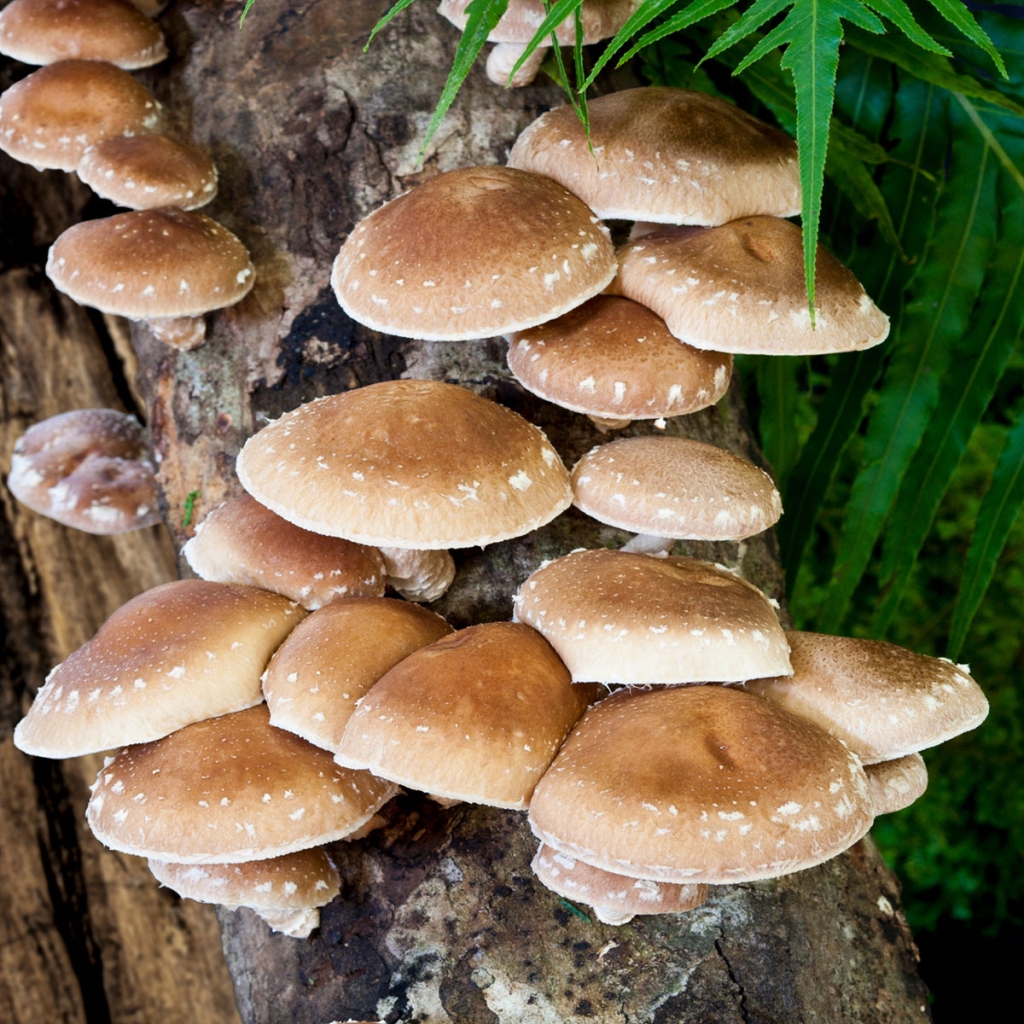 – probably better known as a yummy food, Shiitake also offers a number of health and immune benefits. Studies have found it increases the number of immune cells, including T cells and natural killer cells, support healthy cell growth and turnover, and may boost adaptive immune responses. Some of its immune benefits is likely derived from it benefiting gut microbiota. Evidence also suggests it may improve immune cell functionality. Several studies have found promising direct actions with various pathogens as well. Holistically, Shiitake supports heart and cardiovascular health along with liver protective activity.*
– probably better known as a yummy food, Shiitake also offers a number of health and immune benefits. Studies have found it increases the number of immune cells, including T cells and natural killer cells, support healthy cell growth and turnover, and may boost adaptive immune responses. Some of its immune benefits is likely derived from it benefiting gut microbiota. Evidence also suggests it may improve immune cell functionality. Several studies have found promising direct actions with various pathogens as well. Holistically, Shiitake supports heart and cardiovascular health along with liver protective activity.*
Resilience
 Immune health, emphasizing “health” is all about establishing and building resilience. We want an immune system that is prepped, quick to respond, and correctly responding, not over-responding, and then is able to do it over and over again as needed – resilient. A resilient immune system is adaptable, flexible, and able to learn. Tonic allies, such as the functional mushrooms mentioned, allow us to keep our immune system operating optimally, year-round. When properly nourished and supported, your immune system is amazingly capable of fending off whatever health challenges arise. The weaker the immune system, the greater the likelihood of illness. Support your body and immune system, year-round, by supplying it with the nutrients it needs to do its jobs, while nourishing and encouraging resilience, wellness, and vitality with functional mushroom allies.*
Immune health, emphasizing “health” is all about establishing and building resilience. We want an immune system that is prepped, quick to respond, and correctly responding, not over-responding, and then is able to do it over and over again as needed – resilient. A resilient immune system is adaptable, flexible, and able to learn. Tonic allies, such as the functional mushrooms mentioned, allow us to keep our immune system operating optimally, year-round. When properly nourished and supported, your immune system is amazingly capable of fending off whatever health challenges arise. The weaker the immune system, the greater the likelihood of illness. Support your body and immune system, year-round, by supplying it with the nutrients it needs to do its jobs, while nourishing and encouraging resilience, wellness, and vitality with functional mushroom allies.*
